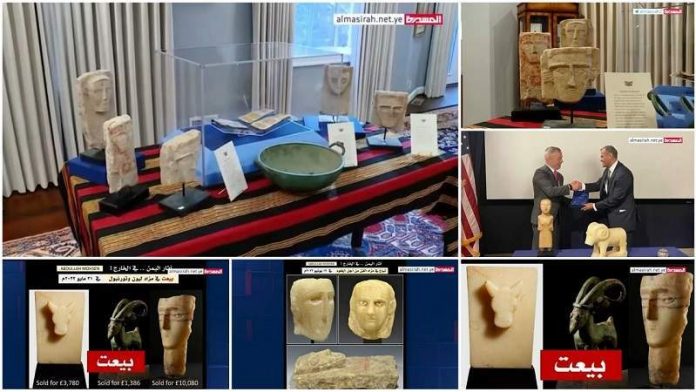Yemen’s Historical Antiquities In Western Auctions Due To US-Saudi Aggression
The smuggling and sale of Yemen’s antiquities has flourished in global auctions recently, from the US to Britain, France and Germany to the Zionist enemy entity, after the aggression coalition focused during the past years on destroying immutable antiquities with its criminal raids and the demolition shovels of its takfiri tools.
According to specialists in antiquities, 4 antiques were sold yesterday at the auction of the famous House of Lyon and Turnbull, “Form Through Time.” 16 days later, 3 more pieces will be sold at the Art for Immortality auction in New York, that is, at a close distance from the UN building and its bodies, which criminalize the sale of smuggling antiquities and calls for the protection of heritage sites as a common global asset that needs protection.
What were sold was a head carved from striped alabaster, with a bronze ibex, from the beginning and middle of the first millennium BC, made of cast bronze, in addition to a memorial plaque of carved alabaster, in relief with a central head of a bull with engraved features, from the third century BC.
The artifacts offered for sale later include the head of a man made of alabaster with inlaid eyes, and a tombstone made of limestone, rectangular in shape, in the upper half of which is a prominent face of a man, in addition to an abstract head of alabaster. These pieces date back to the third and second centuries BC.
And because smuggling does not only include pieces that were stolen from museums, but also from random excavations of archaeological sites, there is no specific statistics on the number of smuggled antiquities, although estimates indicate that thousands of rare pieces and manuscripts were smuggled.
Collecting the fragments of Yemeni antiquities seems impossible because those who claim to protect the history of Yemen, its treasures and collectibles abroad are trading and promoting them, exploiting their control over the occupied areas and their control over airports, land and sea ports.
The bleeding of antiquities smuggling will remain relentless, unless Yemen achieves its independence, and the arduous task remains in tracking down these antiquities in auctions and black markets, and engaging in dozens of judicial disputes to recover them.

